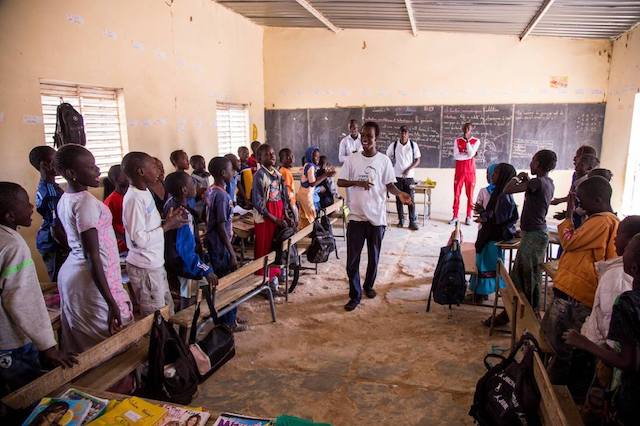Updated
CorpsAfrica – From a Vision to Reality – Jean R. AbiNader
Jean R. AbiNader
January 22, 2020

Jean R. AbiNader, Moroccan American Center
Liz Fanning is more than a dreamer; she is a visionary who has made her dream, CorpsAfrica, a reality, overcoming multiple obstacles and demonstrating that Africans can work across tribal and ethnic identities to build their communities. Her background is well-known. She notes that, “When I was a Peace Corps Volunteer in Morocco, amazing young Moroccans used to ask me if they could do what I was doing – they’d say, ‘I’m Moroccan, I want to help my country, can I be a Peace Corps Volunteer?’ and I had to say, ‘Sorry, it’s only for Americans.’ I started CorpsAfrica so they could have the same opportunity I did to learn, grow, and make an impact.”
Thanks to early support from many generous donors, but especially OCP, the largest company in Morocco, Liz was able to launch the program there, extend it to Malawi, Senegal, and Rwanda, and now is working to grow to six new countries. “I’d hope we have 1,000 Volunteers a year serving in 15 African countries in the next five years,” she replied when asked about the future.
While the concept may not be revolutionary, the cultural constraints that often exist in local rural communities in any country (think someone from the Bronx going to rural Louisiana or a well-educated, middle class Moroccan venturing into the Amazigh interior or Sahrawi south of Morocco) can be quite challenging for the Volunteer as well as the community. Having personally been part of development programs from western Pennsylvania to Yemen, it is this bridging of the cultural divide that most impresses me about CorpsAfrica.
As Fanning explains it, “The CorpsAfrica experience is about getting out of your comfort zone, immersing yourself in another culture (often learning a local dialect), listening to local people, taking the time to create understanding, trust, and friendship, and building capacity using local assets.” She adds that 94% of CorpsAfrica Volunteers report a deeper understanding of their own country. A Senegalese Volunteer serving in Rwanda said, “I used to be a proud Senegalese. Now I’m a proud African.”
Introducing community development projects through outside organizations can pose a problem. Liz notes that, “We intentionally started CorpsAfrica in countries with a long history of the Peace Corps, so that people know what this is. It’s not a big leap to have country nationals as Volunteers instead of Americans. In fact, it can be easier for the local people to relate to the Volunteers and to start working with them quickly. Explaining the concept can sometimes be tricky and people are often suspicious because of previous interventions by other NGOs; that’s why it takes time to build trust.”
The CorpsAfrica development model focuses on empowering local communities by listening, acting, and evaluating. Before moving to their sites, Volunteers undergo four weeks of intensive training, learning about options for community development, including potential in-country partners such as international and local NGOs, government agencies, and companies, which can provide resources to support local communities. They also learn how to empower local communities to work with partners on collaborative projects to respond to the needs of the people. All of these activities are monitored and impact evaluations carried out to continue the learning process of doing it better the next time.
For the Volunteers, it is a life-long learning experience. As Liz frames it, “Expectations are everything. The community’s expectations of the Volunteers, the Volunteers’ expectations of CorpsAfrica – and most importantly, the Volunteers’ expectation of themselves. This is service learning. Through this immersive experience of service, the Volunteers learn about their own strengths and weaknesses; they learn how hard it is to make change; they learn how critically important it is for the local people to take the lead on development efforts; and they learn that if you want to help someone, listen to them. We believe that listening will lead to sustainable projects, which will in turn lead to greater life lessons for the Volunteers, who will then be ready to secure high quality jobs and become job creators. That’s another lesson: the impact on the Volunteer is important. The impact on the community is important. The synergy of both of these together (feeding on each other) creates the magic of CorpsAfrica.”
Another important catalytic role of CorpsAfrica is to promote a culture of philanthropy in Africa. Fanning believes that “Local ownership (from the bottom up and from the top down) leads to sustainable development. Through its critical early and ongoing investment, OCP has given CorpsAfrica the chance to become the organization we envisioned. Further, CorpsAfrica’s unique model provides an opportunity to leverage OCP’s support to encourage new African donors, and build long-term, predictable, local support for the CorpsAfrica Volunteers and their small-scale, high-impact projects in rural African villages, which, through public-private partnerships, helps put Africa on the pathway to self-reliance.”
So congratulations and continued success to Liz Fanning and the CorpsAfrica partners and Volunteers, making a difference in the quality of life in rural African communities by enabling people to realize their dreams. Now we can help CorpsAfrica expand its mission and its effectiveness.
